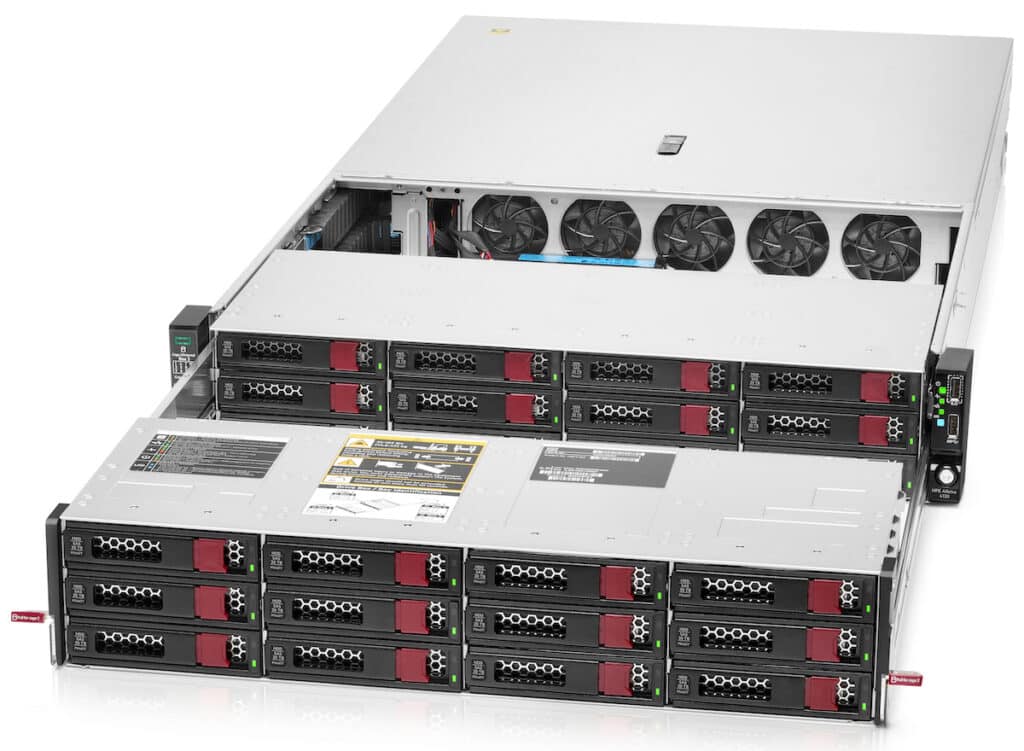HPE has announced the launch of the HPE Alletra 4000, the latest addition to the company’s portfolio of cloud-native data infrastructure solutions. The HPE Alletra 4000 is designed to offer a secure, intuitive, and cost-effective solution for data-driven organizations looking to efficiently store, protect, and extract value from their data.
The HPE Alletra 4000 is built to accelerate data-driven initiatives at any scale, with optimized capacity, performance, economics, density, serviceability, and supportability. It is powered by 4th Gen Intel Xeon Scalable processors and is suitable for a range of data-centric workloads, including real-time data processing, ransomware protection, compliance and e-discovery, video surveillance, medical imaging, machine learning, stream and batch analytics, and more.
It is worth noting, the Alletra 4000 storage servers start the takeover of what was previously under the HPE Apollo 4000 brand. HPE is consolidating its brand strategy and will no longer release new products in the Apollo family.
HPE Alletra 4000 Hardware
The HPE Alletra 4000 is available in two models: the HPE Alletra 4110 and the HPE Alletra 4120. While both look eerily similar to ProLiant servers, there are important design differences. Specifically, as ProLiant servers have to be able to handle an infinite number of potential workloads, with Alletra 4000 storage servers, HPE can be more prescriptive in how every element is handled, to deliver even storage performance. Much of this shows up in the block diagrams, and when we eventually get hands-on with these systems, we can dig more into the key differences between ProLiant and Alletra.
The Alletra 4110 is a 1U all-NVMe storage server designed for high-performance workloads, including data stores for machine learning, distributed and NoSQL databases, and hyperconverged infrastructure. These systems support up to 20 EDSFF(E3.S) or SFF NVMe SSDs with up to 315GB/s of PCIe Gen5 bandwidth for the SSDs.

The Alletra 4120 is a 2U hybrid-NVMe storage server suitable for a broader range of data-centric workloads, including big data analytics, virtualization, and file services.
The 4120 systems support up to front 24 LFF with 4 LFF, 12 EDSFF or 6 SFF in the rear, or up to front 48 SFF with 12 EDSFF or 6 SFF in the rear; with up to 225.6 GB/s of bandwidth to PCIe Gen5 NVMe, 24 Gb SAS, or 6Gb SATA drives.

Both systems offer GPU and FPGA support to accelerate various workloads, as well as security features such as a physical bezel lock, logical Configuration Lock, Secure Boot, and FIPS 140-2 Smart Encryption. HPE Alletra 4000 also offers end-to-end security for both systems and data. From silicon to software and factory to cloud, the system is engineered with zero trust security at its core and provides integrated IT security to increase business agility. Data within the platform is also secured with AES-256 encryption.
The HPE Alletra 4000 also includes HPE Integrated Lights Out 6 (iLO 6), which protects both server and storage/network controller firmware, and a 5-factor authentication model for secure connections to the HPE GreenLake Cloud Platform.
HPE Greenlake
The HPE Alletra 4000 can be self-managed on the HPE GreenLake edge-to-cloud platform or consumed as a service with HPE GreenLake to shorten project deployment times and free up capital and IT resources. For more information on HPE GreenLake we have a great recent podcast on the subject. There were also many updates from HPE Discover this summer regarding new cloud services on GreenLake.
HPE Alletra 4000 Availability
These systems are expected to be generally available in Q2 2023.
Market Impact
The storage industry is always in search of hardened platforms for SDS solutions. It’s been many years since we took a deep look at HPE Apollo, but back then we applauded the dense chassis design and management software. While the form factors have changed over the years and the systems have been greatly sped up, the results with Alletra 4000 are kind of the same. Customers and integrators get access to an already robust server platform heritage from ProLiant, that gets tuned for application-specific storage server needs.
These two platforms are both interesting to us, but the 1U 4110 is the obvious show pony. The dense 1U node with Gen5 E3.S SSDs should be exciting to anyone looking for pure performance and capacity out of a storage server. HPE quotes a best case of 315GB/s of storage bandwidth, it’s going to be very interesting to see how much of that horsepower can be delivered to the wheels when these get packaged up into a complete storage solution.




 Amazon
Amazon